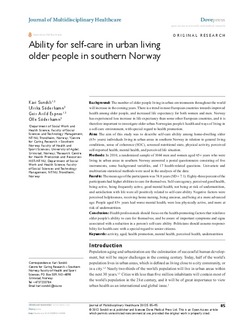Ability for self-care in urban living older people in southern Norway
Journal article, Peer reviewed
Permanent lenke
http://hdl.handle.net/11250/284918Utgivelsesdato
2012Metadata
Vis full innførselSamlinger
- Institutt for sosialt arbeid [1367]
- Publikasjoner fra CRIStin - NTNU [38070]
Sammendrag
Background: The number of older people living in urban environments throughout the world will increase in the coming years. There is a trend in most European countries towards improved health among older people, and increased life expectancy for both women and men. Norway has experienced less increase in life expectancy than some other European countries, and it is therefore important to investigate older urban Norwegian people’s health and ways of living in a self-care environment, with special regard to health promotion. Aim: The aim of this study was to describe self-care ability among home-dwelling older (65+ years) individuals living in urban areas in southern Norway in relation to general living conditions, sense of coherence (SOC), screened nutritional state, physical activity, perceived self-reported health, mental health, and perceived life situation. Methods: In 2010, a randomized sample of 1044 men and women aged 65+ years who were living in urban areas in southern Norway answered a postal questionnaire consisting of five instruments, some background variables, and 17 health-related questions. Univariate and
multivariate statistical methods were used in the analyses of the data. Results: The mean age of the participants was 74.8 years (SD = 7.1). Eighty-three percent of the
participants had higher abilities to care for themselves. Self-care agency, perceived good health,being active, being frequently active, good mental health, not being at risk of undernutrition, and satisfaction with life were all positively related to self-care ability. Negative factors were perceived helplessness, receiving home nursing, being anxious, and being at a more advanced age. People aged 85+ years had worse mental health, were less physically active, and more at risk of undernutrition. Conclusion: Health professionals should focus on the health-promoting factors that reinforce older people’s ability to care for themselves, and be aware of important symptoms and signs
associated with a reduction in a person’s self-care ability. Politicians should assume responsibility for health care with a special regard to senior citizens.
Keywords: activity, aged, health promotion, mental health, perceived health, undernutrition
Beskrivelse
- Published article -cc-by-nc
